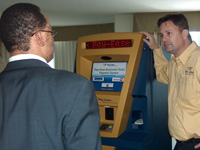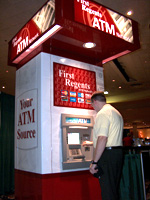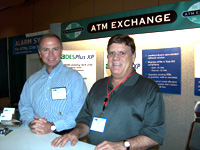News
ATMIA East '05 is big -- in numbers and initiatives
The ATM Industry Association Conference East in Miami was huge for the international trade association in terms of attendees, exhibitors and new initiatives.
April 25, 2005
Reporter Tracy Kitten also contributed to this story.Click to view a slide show from the ATMIA Conference East in Miami.
The ATM Industry Association Conference East Feb. 14-16 in Miami was huge for the international trade association - in terms of attendees, exhibitors and new initiatives.
ATMIA hosted 540 attendees, the most ever, and some 60 exhibitors. Even more important, it announced ambitious projects like the formation of a Debit Council, which will help develop and encourage best practices for debit products including prepaid cards.
ATMIA's continued strong growth was further evidenced by President Tom Harper's announcement that the organization has added at least one new member a day since December, for a total membership approaching 600. (Disclosure: Harper is also publisher of ATMmarketplace.)
Miami attendees were so busy, few of them (including this editor) ventured outside to enjoy the beach that beckoned nearby. Here's a small sampling from the exhibit hall and presentation rooms:
 |
Dean Scaros, president and CEO of Pay-Ease, shows off the Pay-Ease V Series, a multi-functional bill-payment kiosk. |
We're going to Disney World: Next year's ATMIA East event will be Feb. 15-17 at Walt Disney World's Swan & Dolphin Resort in Orlando, Fla. ATMIA West is scheduled for Sept. 14-16 at the Hyatt Regency Scottsdale at Gainey Ranch in Scottsdale, Ariz.
…and just about everywhere else around the world: Later this year, ATMIA will present conferences in Cape Town, South Africa, Hong Kong and Toronto - a sign of its increasingly global membership.
Windows of opportunity: ATM Exchange expects to go into production next month with a new upgrade kit called 3DES Plus XP. Like ATM Exchange's 3DES Plus, the new version uses ATM Exchange's Visa-approved encrypting PIN pad, manufactured by Sagem, to take older ATMs to Triple DES compliance. The XP version adds a PC processor equipped with Microsoft's Windows XP and a multi-vendor software application created by KAL.
Paul Dunphy, ATM Exchange's vice president of corporate sales, said he knows of no other third-party service provider offering a hardware/software combination that will not only bring ATMs into compliance with Triple DES mandates but also move them to a Windows platform. "We're giving Mr. Banker more choices," he said.
Giving sneakers a rest: Providing ATM advertising campaigns for the Wawa and Thorntons c-store chains has become far easier since PNC Bank switched the machines at some of those locations to a Windows platform, said Shelly Chandler, PNC's vice president of ATM Banking. First Data Corp., which drives PNC's ATMs, uses its Content Manager product to download ads to the ATMs, which piggyback on the stores' frame relay networks.
Some 600 machines currently use this approach, with more to be added this year. "I believe customer-focused, in-store advertising could really take off with this technology," said Chandler during her presentation on Windows-based ATMs. The next step for PNC and First Data is developing day-part ads, in which the machines will run ads appropriate for different times of the day.
… but not retiring them: Though a reduction in service calls is one of the promises of Windows-based machines, Chandler said it won't occur overnight. Because most deployers won't make a wholesale change to Windows, networks will be "even more fragmented" for the next few years.
Chandler said that PNC has seen a 50-50 split between service calls involving software and those involving hardware, rather than the 10-90 hardware/software split common in machines running OS/2. Though remote software fixes are possible, she said, bandwidth limitations make it difficult to transmit large amounts of data such as patches.
(Not quite) under the radar: Several folks reported seeing Frank Capan, the former president of Access Cash, on the exhibit floor. Word is, the non-compete agreement Capan signed after selling the Access Cash business to eFunds is about to expire.
Rookie move: Making small talk with representatives in Triton's booth, a new distributor asked company founder and chairman emeritus Ernest Burdette, "So, how long have you been with Triton?"
Tastiest advertising slogan: In the Ernest Communications booth, they handed out coffee drinks - espressos and the like - in cups emblazoned with the words: "Save a Latte." Ernest buys phone time in bulk from carriers around the country and re-sells it to ATM deployers, usually resulting in savings of at least 15 percent, according to Jay Morris, the company's vice president of sales and marketing.
 |
Sebastian Abbott, operations director for First Regents, stands with the company's new model 4838 enclosure, which can fit most ATM makes and models. |
International interest: Sabrina Andrews-Turner, president of Pi Systems, said the company's 3DES Fix product, which upgrades older Diebold and NCR ATMs to Triple DES compliance, is attracting interest in a number of international markets, particularly in countries where those two vendors do not have extensive service/support infrastructures. ATM Components and Technology recently signed an exclusive distribution deal for the product.
Loan by phone: A company called Pronto is offering what it calls the Loan by Phone program as a value-added product for ATM distributors. According to a Pronto rep, folks can call an 800 number and be approved for a loan over the phone, based on their income and check-cashing history.
They then purchase a prepaid debit card for $9.95 from a store cashier and use an activation number they received during the initial call to access the funds - likely, at least some of it, at the store's ATM. "You've put a card with cash in their hand, and there's an ATM right in front of them," he said.
Cardholders must repay loans, including 5 percent interest and a $59.95 access fee, within 14 days of the receipt of funds.
See no evil opportunity: A company called GuardCash is offering a product called the GCL-100 that combines two quarter-inch thick iron tubes anchored to four bolts and a heavy chain inside the ATM. The twist: Part of the chain is visible outside the ATM.
Most thieves will get the picture and go elsewhere, said Johnny Huang, the company's national marketing manager. GuardCash developed it because of thefts at its own ATMs, Huang said, and uses it on about half of the 136 machines it has under contract. The GCL-100 retails for $295.
Coming off a big year: Bill Dunn, Tranax'svice president of sales, said the company wrapped its best year ever in 2004, selling 11,400 units in North America. Rival Triton also reported its strongest year, shipping 20,000 units worldwide.
Savvier salesmanship needed: A significant chunk of Tranax's 2004 sales were of replacement units, Dunn said. Looking ahead, he said more sophisticated salesmanship will be required to interest ATM owners in value-added services like ticket and gift card sales and check cashing (some of the services being demonstrated in the Tranax booth) at ATMs.
"We aren't going to be able to rely on selling cash dispensing alone forever. We need to figure out ways to get people to replace their cash dispensers with full-function units," Dunn said. "We're going to have to sell ATMs and not just pricing - go back and look at how we sold ATMs before the surcharge."
Easy upgrades: Mark Levenick, Tidel's CEO, said his company's 3000 series of ATMs all feature the same electronics, which makes them easy to upgrade if transaction volumes warrant doing so. For instance, the 3400 can easily be converted into a 3600 by plugging in a more powerful processor.
Cinch to service: Tidel's through-the-wall 3700 features a rear service screen that can be moved so it faces forward or to either side. This reduces the chances that a tech might have to crawl inside a kiosk to service the machine, Levenick said.
A card is a card is a card: Not exactly, according to Suzanne Lynch, director of global debit fraud management for MasterCard International. During the pre-conference payroll and debit card workshop, Lynch said figuring out how to monitor and regulate prepaid cards is not as easy as it might seem because of the disparity in prepaid products.
 |
Tidel's Mike Hudson talks to an ATMIA East attendee at the Tidel booth. |
"You have to look at each program individually, and that's what makes it hard to set up guidelines," Lynch said. "We don't know enough about prepaid cards (at this point) … and traditional credit card guards don't work so well for gift cards."
Lynch said that the explosion of prepaid products has created an "issuers beware" market. "You have to think differently about what's normal behavior."
A growing problem: Confirming why anti-theft devices seemed to dominate the exhibit hall, Tom Stevenson, president of vault cash supplier Cash Connect, said that $5 million ($3.5 million in cash and $1.5 million in hardware) was taken from ATM locations last year - not including armored carrier theft. That's up from $2.7 million in 2002. During the same time period, the average loss grew from $11,000 to $20,000, Stevenson said during his presentation.
Hot spots: Surprisingly, while c-stores account for 7 percent of all ATM installations, only 3 percent of losses occur there. Stevenson said this is likely due to the fact that many c-stores are well lit, open 24/7 and have obvious alarm systems. Conversely, hotels account for 3 percent of installations but 20 percent of losses. Stevenson believes this is because machines are sometimes placed in isolated areas and often are not bolted down (because of concerns over damaging floors).
Eastern expansion: A Triton representative said his company, which recently opened offices in China, expects to do big business there. "Within five years, we could have double the number of units we have here in the U.S.," he predicted.
Stealth approach: Unlike anti-skimming devices used by some ATM vendors which involve noticeable changes to card readers, a TMD Security device is completely hidden. The small black box resides inside the machine and senses the presence of a skimming device through a connection to the card reader. It sends gibberish to the skimmer and "tricks" it into thinking its memory is full.
C. Heuker of Hoek, managing director of the Danish company, said the product is being tested by financial institutions including HSBC, Barclays and Turkey's Yap Kredi. It's also being used at gas pumps in Belgium.
'X' marks the ATM: NexTran Industries is rebranding part of its ComNet ATM line as Xtremo. All but its highest-end machines, which it markets primarily to financial institutions, are now known as Extremo, said Tony Park, the company's vice president of marketing. The entry-level model features a new 1,000-note dispenser, 8-inch color screen and Windows CE operating system. Park called the machine "our answer to Triton's 9100."
Say uncle: Info Touch Technologies debuted Tio (which translates as "uncle" in Spanish), a brand for a suite of applications including check cashing and bill payment found at its self-service kiosks at stores owned by Circle K, Exxon Mobil and other retailers.
Hamed Shahbazi, Info Touch's chairman and chief executive, said the Tio brand will make it easier for users - primarily unbanked consumers - to find services relevant to them no matter where such kiosks are located.
Cultural considerations: Jorge Fernandez, president and CEO of Capture Systems, said that Mexico's decision to allow ATM surcharges, which goes into effect in June, will likely mean an influx of new players into its off-premises market, which to date has been dominated by his company. "We welcome good, honest competition. We think there's room for a lot of players," he said during his presentation.
However, newcomers from other countries must respect cultural differences in Mexico. "Berlitz can teach language, but it can't teach culture," he said. "You cannot cut-and-paste the North American model and expect it to work in Mexico. Leave the cowboy boots at home and resist the impulse to tell (Mexicans) how it's done."
Jig (saw) is up: First Regents Bancservices is introducing several new ATM enclosures, several of which are awaiting patents, said Sebastian Abbott, the company's operations director. Perhaps the most unique feature, Abbot said, is a design which fits together like a jigsaw puzzle, making structural repairs easy and cheap. The 4838, which was in the First Regents booth, stands 8 feet tall and sells for about $8,000.
 |
From left are KAL's Steve Hensley and ATM Exchange's Paul Dunphy at the ATM Exchange booth. |
New on the block: Pay-Ease Inc. introduced its Pay-Ease V Series, which will hit the market in July, from a 17th floor suite in the show hotel. The bill-payment kiosk, which runs on the Linux operating system, is manufactured by Pay-Ease. The base model comes with two cash cassettes but can be upgraded to four. With a 15-inch screen, card reader, check reader, bill acceptor, bill scanner and encrypted keypad, the base sales price is just less than $10,000.
Hard to ignore: Premier GPS demonstrated the loudest product in the exhibit hall, an alarm that is triggered when an ATM's vault is opened or the machine is unplugged without pre-approval from an authorized user. The product retails for $249. The price rises to $449 with the addition of a wireless alarm backup and to $649 with both wireless and a GPS tracking system that will allow deployers to track movement of stolen ATMs.
Adel Tabsh, Premier's president and CEO, said the product features a battery that can keep the alarm going for eight days - to encourage smash and grabsters to dump a machine rather than risk capture. The product makes allowances for normal ATM issues - such as a delay of 10 seconds in case of common power fluctuations.
Adding apps to ATMs: Charles Caserta, president of Livewire International, a company that sells tickets at self-service kiosks, said destination tickets (for venues such as ski resorts and amusement parks) and ATMs could be "a marriage made in heaven."
Though he understands the skepticism of some deployers when it comes to offering new products at ATMs, he said, "Whoever would have believed people would pay $2 to get their own cash? It's 2005, and this industry needs to do what it did in 1995. Seize the opportunity."
Included In This Story
ATM Industry Association (ATMIA)
The ATM Industry Association, founded in 1997, is a global non-profit trade association with over 10,500 members in 65 countries. The membership base covers the full range of this worldwide industry comprising over 2.2 million installed ATMs.
Triton Systems
Triton FI based products • NO Windows 10™ Upgrade • Secured locked down system that is virus/malware resistant • Flexible configurations - Drive-up and Walk-up • Triton's high security standards • NFC, anti-skim card reader, IP camera and level 1 vaults are all options • Triton Connect monitoring • Lower cost
Diebold Nixdorf
As a global technology leader and innovative services provider, Diebold Nixdorf delivers the solutions that enable financial institutions to improve efficiencies, protect assets and better serve consumers.
 ChatGPT
ChatGPT Grok
Grok Perplexity
Perplexity Claude
Claude













